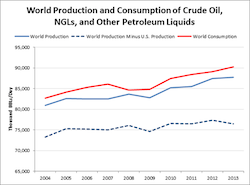In a recent blog post authored by Geoff Cooper, senior vice president of the Renewable Fuels Association (RFA), the American Petroleum Institute (API) recently released a study that argues that the fracking boom has led to dramatically lower prices for crude oil and refined products between 2008-2013. Cooper wrote that the study suggests that increased  domestic production of crude oil, natural gas liquids (NGLs) and lease condensate from fracking has already extended U.S. supplies and helped to lower gas prices.
domestic production of crude oil, natural gas liquids (NGLs) and lease condensate from fracking has already extended U.S. supplies and helped to lower gas prices.
The study finds that every 1 million barrels/day of new supply reduces consumer prices for petroleum products between $0.06-0.20 per gallon. Cooper writes that according to economics more supply generally results in lower prices, in this case there are two problems with API’s rationale.
- Problem 1: Global demand for petroleum products continues to grow faster than global supply. EIA data show global production of crude oil, NGLs and condensate grew by 4.1 million barrels/day between 2008 and 2013. But global consumption of those products ramped up by 5.4 million barrels/day over the same period. Thus, demand gains outstripped supply gains by more than 30%.
- Problem 2: When energy economist Phil Verleger and researchers at Louisiana State University, Iowa State University, University of Wisconsin, the Department of Energy, and others separately showed that extending the U.S. gasoline supply with ethanol leads to lower pump prices, Big Oil defiantly screamed “NOT SO!” Verleger found that consumer paid $0.50-$1.50 per gallon less for gasoline in 2013 because of ethanol’s extension of the fuel supply. His conclusion corroborated results from Iowa State/University of Wisconsin that showed consumers saved up to $1.09 in 2012 due to ethanol’s aggregate effect on gasoline supplies.
Cooper ends his article by asking the question, “So, which is it API? Does adding volume to the fuel supply reduce prices, or doesn’t it?”

